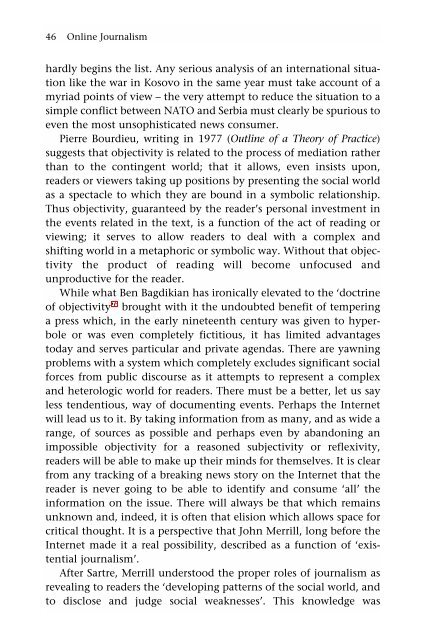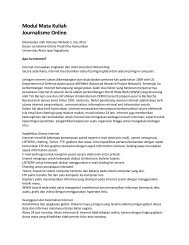Online Journalism - Ayo Menulis FISIP UAJY
Online Journalism - Ayo Menulis FISIP UAJY
Online Journalism - Ayo Menulis FISIP UAJY
Create successful ePaper yourself
Turn your PDF publications into a flip-book with our unique Google optimized e-Paper software.
46 <strong>Online</strong> <strong>Journalism</strong><br />
hardly begins the list. Any serious analysis of an international situation<br />
like the war in Kosovo in the same year must take account of a<br />
myriad points of view – the very attempt to reduce the situation to a<br />
simple conflict between NATO and Serbia must clearly be spurious to<br />
even the most unsophisticated news consumer.<br />
Pierre Bourdieu, writing in 1977 (Outline of a Theory of Practice)<br />
suggests that objectivity is related to the process of mediation rather<br />
than to the contingent world; that it allows, even insists upon,<br />
readers or viewers taking up positions by presenting the social world<br />
as a spectacle to which they are bound in a symbolic relationship.<br />
Thus objectivity, guaranteed by the reader’s personal investment in<br />
the events related in the text, is a function of the act of reading or<br />
viewing; it serves to allow readers to deal with a complex and<br />
shifting world in a metaphoric or symbolic way. Without that objectivity<br />
the product of reading will become unfocused and<br />
unproductive for the reader.<br />
While what Ben Bagdikian has ironically elevated to the ‘doctrine<br />
of objectivity’ 6 brought with it the undoubted benefit of tempering<br />
a press which, in the early nineteenth century was given to hyperbole<br />
or was even completely fictitious, it has limited advantages<br />
today and serves particular and private agendas. There are yawning<br />
problems with a system which completely excludes significant social<br />
forces from public discourse as it attempts to represent a complex<br />
and heterologic world for readers. There must be a better, let us say<br />
less tendentious, way of documenting events. Perhaps the Internet<br />
will lead us to it. By taking information from as many, and as wide a<br />
range, of sources as possible and perhaps even by abandoning an<br />
impossible objectivity for a reasoned subjectivity or reflexivity,<br />
readers will be able to make up their minds for themselves. It is clear<br />
from any tracking of a breaking news story on the Internet that the<br />
reader is never going to be able to identify and consume ‘all’ the<br />
information on the issue. There will always be that which remains<br />
unknown and, indeed, it is often that elision which allows space for<br />
critical thought. It is a perspective that John Merrill, long before the<br />
Internet made it a real possibility, described as a function of ‘existential<br />
journalism’.<br />
After Sartre, Merrill understood the proper roles of journalism as<br />
revealing to readers the ‘developing patterns of the social world, and<br />
to disclose and judge social weaknesses’. This knowledge was
















